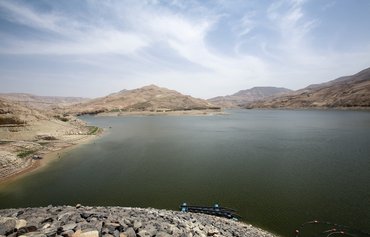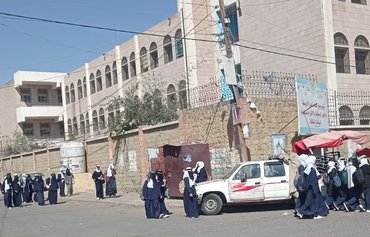ADEN -- At a distribution point on a Sanaa street, 6-year-old Nada and her mother fill 20-litre containers with water, as they do each day while Nada's three siblings are in school.
Nada's mother said her family cannot afford to buy water from the tankers that sell water and transport it to people's homes.
"My family relies on public water distribution points in Sanaa that provide water for free," she said.
"The war has caused intense human suffering and economic deterioration, making family income insufficient for buying even basic food necessities," she said.
![Women and children fill containers with water from public distribution points to secure their water needs for one day. [Haitham Mohammed/Al-Mashareq]](/cnmi_am/images/2023/03/02/40849-water-distribution-point-600_384.jpg)
Women and children fill containers with water from public distribution points to secure their water needs for one day. [Haitham Mohammed/Al-Mashareq]
Many families are facing similar circumstances as a consequence of the conflict, which began when the Iran-backed Houthis staged a coup in Sanaa in September 2014.
Arms smuggled into the country from Iran have helped to fuel the war, and the Houthis have been widely blamed for the expiration of a truce in October, despite "relentless efforts" on the part of the United Nations (UN) to renew it.
In Yemen, the United Nations Children's Fund (UNICEF) says more than 16 million people, including 8.47 million children, are in urgent need of assistance to access Water, Sanitation and Hygiene (WASH).
Water, Sanitation and Hygiene
Yemen Minister of Water and Environment Tawfiq al-Sharjabi and UNICEF representative in Yemen Peter Hawkins signed a WASH aid plan for 2023-2024 on February 13.
Worth $128.3 million a year, the aid package addresses three main areas for UNICEF interventions in all provinces of Yemen.
It aims to enhance systems and capabilities for managing and providing WASH services, ensure more children and families have access to WASH services, and improve hygiene practices in families and society.
Hawkins stressed the need to support the ministry and co-ordinate with it to improve fair access to safe drinking water, sanitation and hygiene practices.
Yemen is one of the world's most water-scarce countries, UNICEF said, noting that the protracted conflict has had a strong impact on access to water and adequate sanitation services for the Yemeni people.
Access to safe and clean drinking water remains crucial for the good health and survival of children and their caregivers, it added.
Community initiatives
"Community initiatives supported by wealthy donors and benefactors help fill drinking water tanks in the neighbourhood where I live," Sanaa community leader Abdul Ghani Saleh told Al-Mashareq.
"Increased poverty, unemployment, tough living conditions and the high cost of living have made it very difficult for people to buy from water tankers," he said.
Each family receives five 20-litre containers of water through these initiatives.
"If water isn't available for just one day, people panic the following day when water does become available," Saleh said.
Resolving the current crisis requires effort to organise water distribution and to ensure families have access to the water they need, he added.
The fuel crisis of the recent years has significantly increased the cost of transporting water, economist Abdul Aziz Thabet told Al-Mashareq, even as purchasing power deteriorated and services were disrupted.
"The disruption of government water services due to fuel shortages has made most people depend on tankers that sell water, leading to high demand and astronomical prices," he said.
"Community initiatives have donated water tanks to neighbourhoods that need water, which has provided a solution for families that cannot afford to buy water tankers," Thabet said.
UNICEF has worked with community initiatives to provide drinking water and supply local water facilities with the fuel they need to pump water, he added.
It also has helped to construct water tanks and purchase water, especially in areas where it is unavailable, Thabet said.
Economist Faris al-Najjar stressed the importance of UNICEF's continued contribution to the provision of clean water to the Yemeni population.
He told Al-Mashareq he would like to see these efforts expanded to include all areas affected by the disruption of water services, especially displacement camps.

![Sanaa residents wait in line to get water from a well belonging to a mosque. Some residents serve as water carriers for meagre wages. [Haitham Mohammed/Al-Mashareq]](/cnmi_am/images/2023/03/02/40850-yemen-water-well-600_384.jpg)





